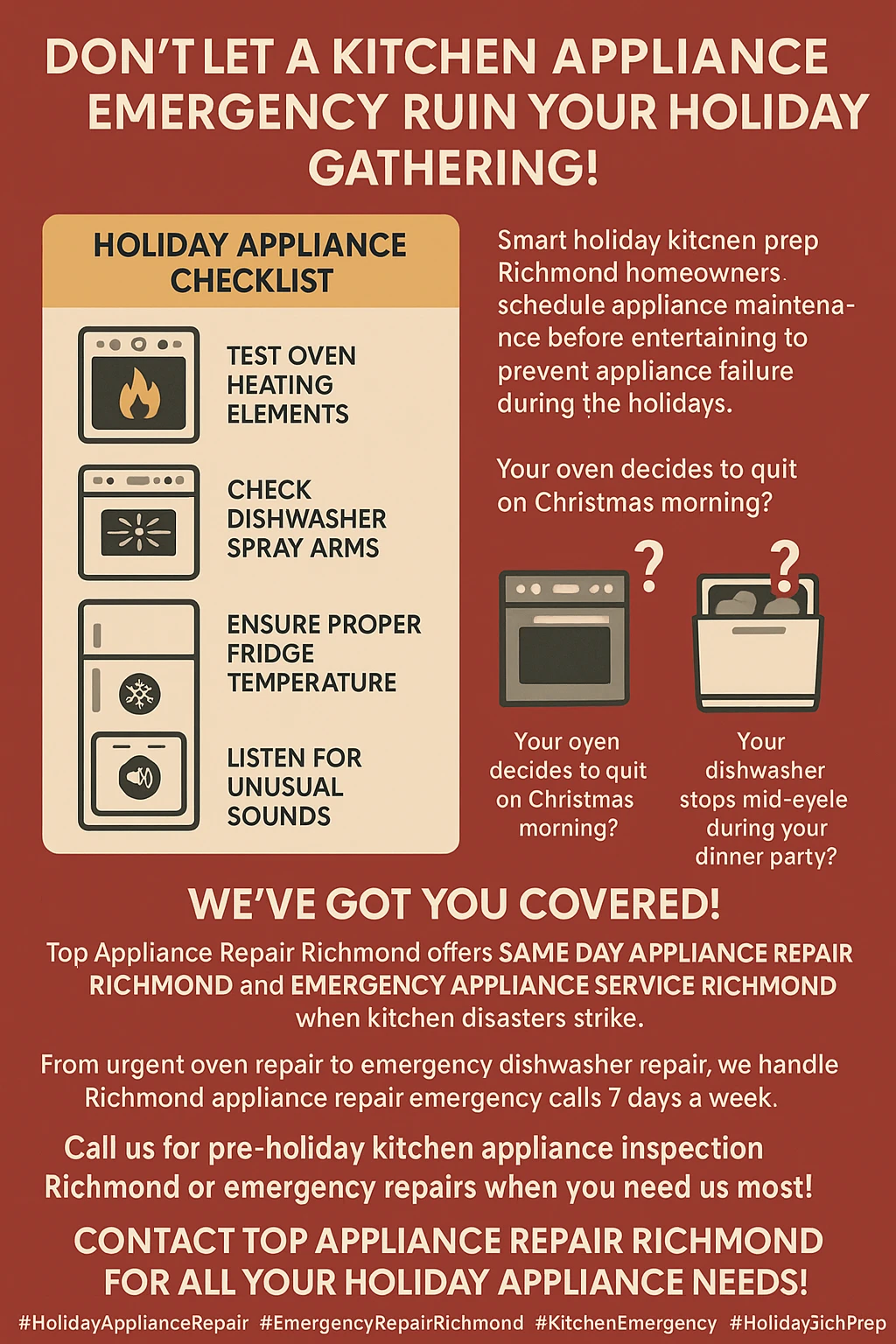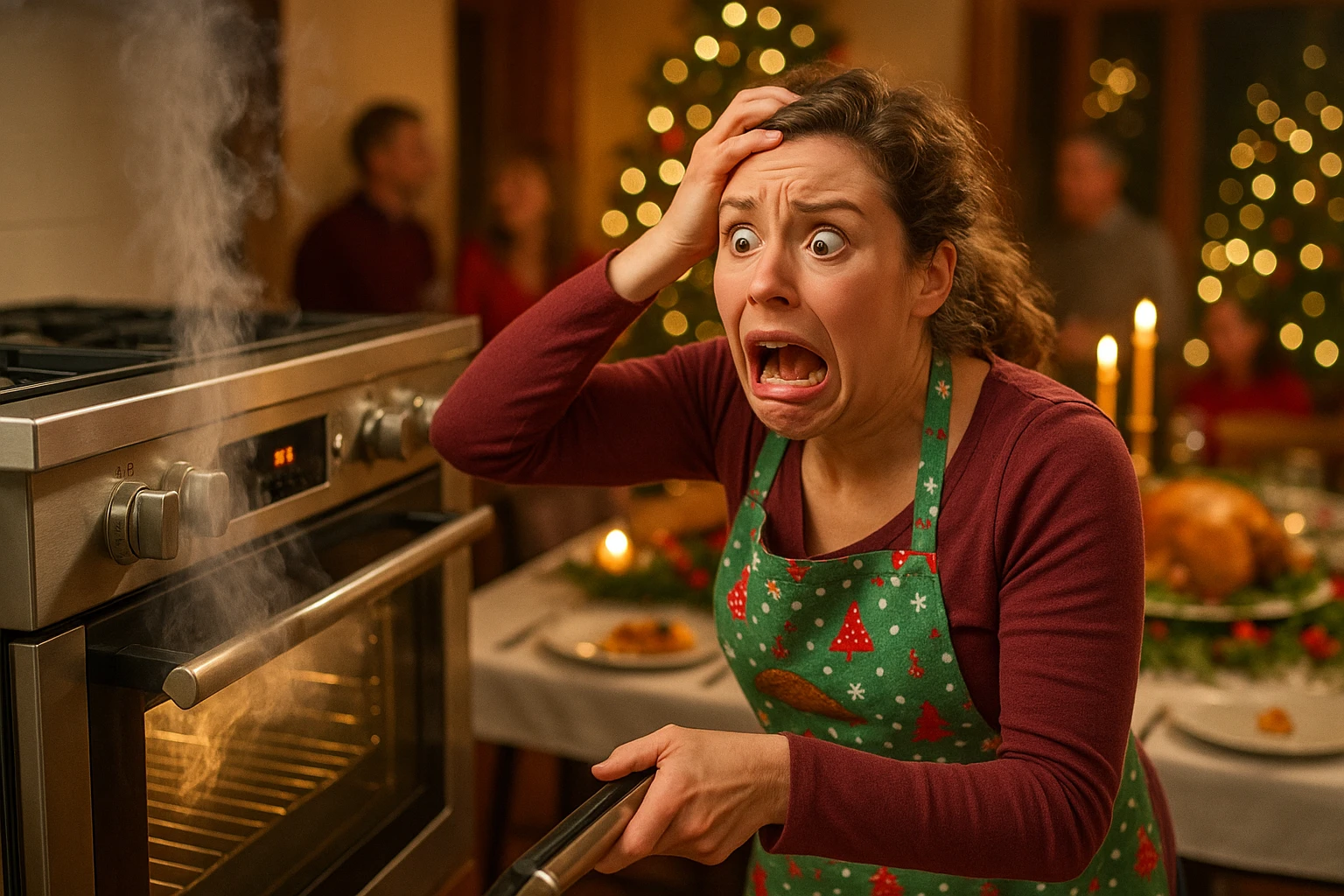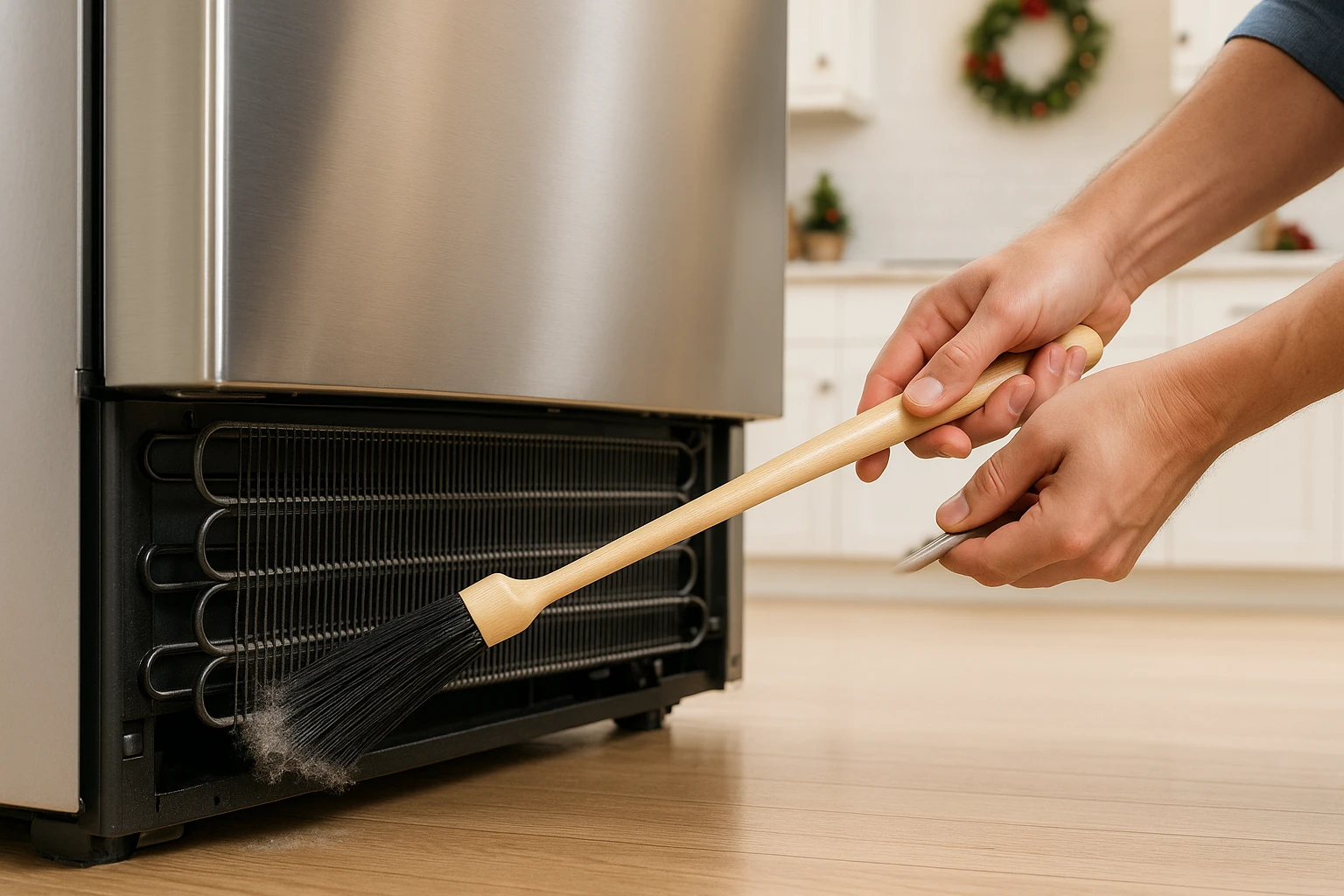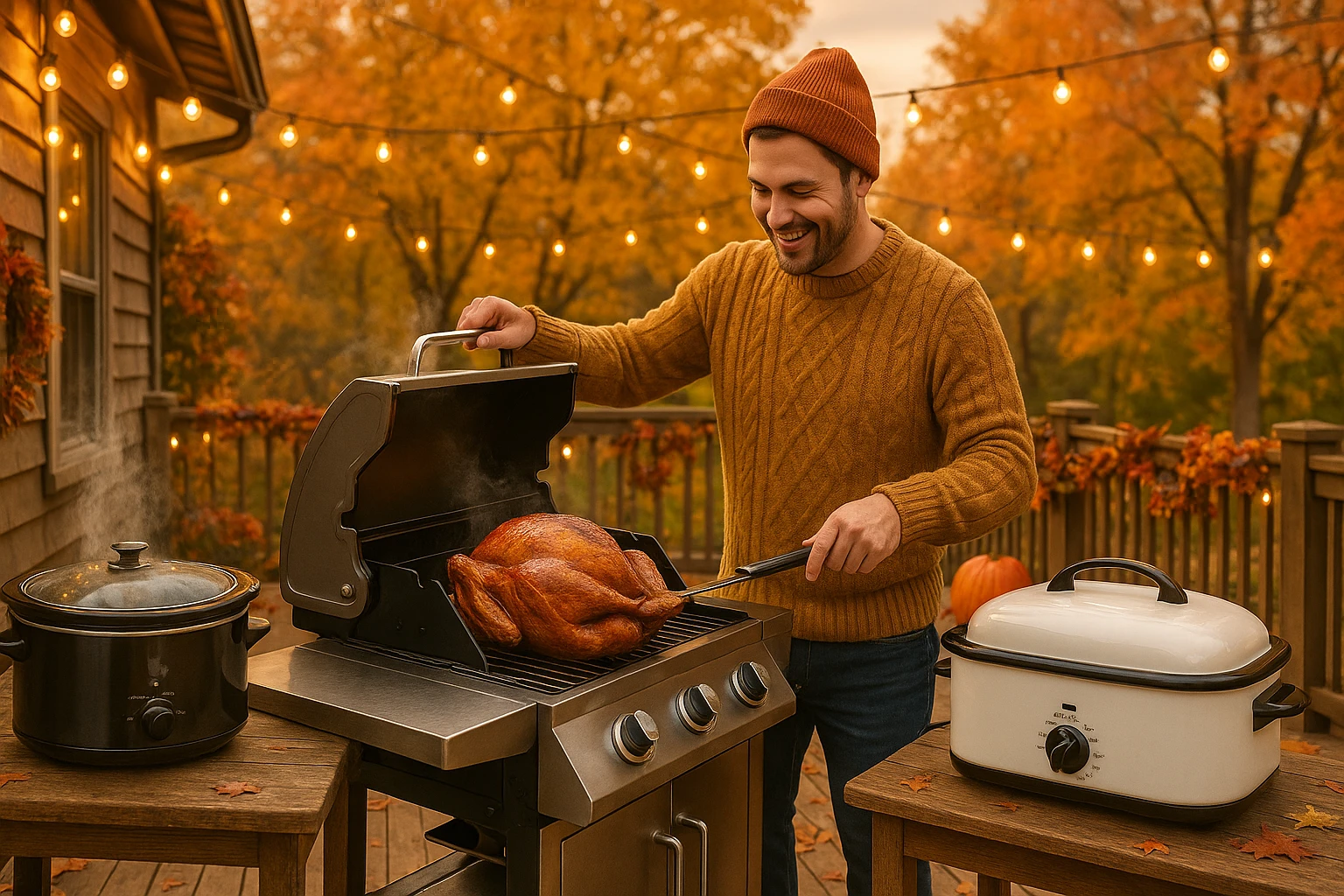Holiday Hosting Horror: How to Emergency-Proof Your Kitchen Appliances Before Guests Arrive
Ready to host the perfect holiday gathering but terrified your kitchen appliances might stage a rebellion at the worst possible moment? Let’s dive into the essential steps to emergency-proof your kitchen before your guests walk through the door, so you can focus on creating memories instead of dealing with appliance meltdowns.Picture this: It’s Thanksgiving morning, your turkey’s ready to go in the oven, and suddenly your range decides to take an unscheduled vacation. Or maybe it’s Christmas Eve, and your dishwasher starts making sounds like a dying walrus just as you’re prepping for your biggest dinner party of the year. Trust me, I’ve been there, and it’s about as fun as finding out your favorite sweater shrunk in the wash – which, coincidentally, also happened to me last holiday season. The holidays are basically the Olympics for our kitchen appliances. They’re working overtime, handling larger loads, and dealing with ingredients they might not see the rest of the year. Just like you wouldn’t run a marathon without training, your appliances need some prep work too. The good news? A little preventive maintenance can save you from those heart-stopping moments when everything goes sideways right before your mother-in-law arrives. Getting your kitchen appliances holiday-ready isn’t rocket science, but it does require some strategic thinking. We’re talking about identifying potential trouble spots, knowing the warning signs of impending appliance doom, and having a game plan when things don’t go according to script. Because let’s face it – when you’re hosting, Murphy’s Law is basically a guarantee.
Key Outtakes:
- Schedule professional appliance maintenance 2-3 weeks before major holidays to avoid emergency repair situations when technicians are booked solid
- Keep essential appliance repair contact information easily accessible, including local Richmond emergency repair services for same-day fixes
- Stock up on basic appliance troubleshooting supplies and know how to perform simple fixes like clearing dishwasher filters and resetting circuit breakers
- Create backup cooking plans using alternative appliances or methods in case your primary cooking equipment fails during meal preparation
- Test all major appliances with holiday-level loads at least one week before guests arrive to identify potential issues early

Understanding Holiday Appliance Stress Points
 The holidays transform our kitchens into high-performance zones that would make a restaurant jealous. Your normally chill appliances suddenly find themselves handling triple-duty loads, extended cooking times, and ingredients that might be completely foreign to their usual routine. Think about it – when was the last time your oven had to maintain 325°F for six straight hours while simultaneously keeping three different dishes at perfect temperatures? Your refrigerator becomes a Tetris master, cramming in twice its normal contents while maintaining perfect temperatures for everything from delicate cream-based desserts to that massive turkey that barely fits on the bottom shelf. Meanwhile, your dishwasher transforms from its usual light-duty cycle routine to heavy-artillery mode, tackling pots and pans that haven’t seen the light of day since last Christmas. It’s like asking your daily commuter car to suddenly perform in the Indy 500 – technically possible, but definitely pushing boundaries. The real kicker is timing. During regular months, if your appliances act up, you’ve got flexibility. Need to call a repair technician? No problem, they can probably come out next week. But during holiday season? Good luck finding someone who isn’t already booked solid with other panicked hosts dealing with their own appliance emergencies. This is why understanding your appliances’ stress points before the holiday rush becomes absolutely critical for successful entertaining.
The holidays transform our kitchens into high-performance zones that would make a restaurant jealous. Your normally chill appliances suddenly find themselves handling triple-duty loads, extended cooking times, and ingredients that might be completely foreign to their usual routine. Think about it – when was the last time your oven had to maintain 325°F for six straight hours while simultaneously keeping three different dishes at perfect temperatures? Your refrigerator becomes a Tetris master, cramming in twice its normal contents while maintaining perfect temperatures for everything from delicate cream-based desserts to that massive turkey that barely fits on the bottom shelf. Meanwhile, your dishwasher transforms from its usual light-duty cycle routine to heavy-artillery mode, tackling pots and pans that haven’t seen the light of day since last Christmas. It’s like asking your daily commuter car to suddenly perform in the Indy 500 – technically possible, but definitely pushing boundaries. The real kicker is timing. During regular months, if your appliances act up, you’ve got flexibility. Need to call a repair technician? No problem, they can probably come out next week. But during holiday season? Good luck finding someone who isn’t already booked solid with other panicked hosts dealing with their own appliance emergencies. This is why understanding your appliances’ stress points before the holiday rush becomes absolutely critical for successful entertaining.
Pre-Holiday Appliance Health Checkups
 Getting ahead of potential appliance failures starts with treating your kitchen equipment like you would your car before a cross-country road trip. You wouldn’t hit the highway without checking your oil and tire pressure, and the same logic applies to your appliances before they tackle holiday demands. The key difference? You can’t exactly pull over to the side of the road when your oven decides to quit mid-turkey roasting. Starting with your refrigerator, this workhorse needs some serious attention before the holiday food invasion begins. Check those door seals by closing the door on a dollar bill – if you can pull it out easily, your seals are compromised and your fridge is working overtime to maintain temperature. Clean out the condenser coils underneath or behind your unit because dusty coils make your refrigerator work harder and run hotter, which is the last thing you want when you’re stuffing it full of holiday goodies. Your oven deserves equal attention since it’s about to become your kitchen’s MVP. Remove those racks and give them a proper scrub – built-up grease and food particles can create hot spots and uneven cooking, turning your perfect turkey into a disaster. Check that your oven thermometer matches the actual temperature by using a separate oven thermometer, because nothing ruins a holiday meal quite like discovering your oven runs 25 degrees cool right when you’re expecting guests. Don’t forget about your dishwasher, which is about to handle more heavy-duty cleaning than it’s seen all year. Remove and clean the bottom filter – that little mesh basket that catches food particles and can become seriously gross if neglected. Run an empty cycle with dishwasher cleaning solution or white vinegar to eliminate built-up soap scum and mineral deposits that could interfere with proper cleaning during your holiday dish marathon. Your garbage disposal might seem like a minor player, but it becomes crucial when you’re generating turkey bones, vegetable peels, and other holiday food waste. Run ice cubes through it to sharpen the blades, followed by citrus peels to freshen things up and eliminate any lingering odors that could become problematic when you’re trying to impress guests with your culinary skills.
Getting ahead of potential appliance failures starts with treating your kitchen equipment like you would your car before a cross-country road trip. You wouldn’t hit the highway without checking your oil and tire pressure, and the same logic applies to your appliances before they tackle holiday demands. The key difference? You can’t exactly pull over to the side of the road when your oven decides to quit mid-turkey roasting. Starting with your refrigerator, this workhorse needs some serious attention before the holiday food invasion begins. Check those door seals by closing the door on a dollar bill – if you can pull it out easily, your seals are compromised and your fridge is working overtime to maintain temperature. Clean out the condenser coils underneath or behind your unit because dusty coils make your refrigerator work harder and run hotter, which is the last thing you want when you’re stuffing it full of holiday goodies. Your oven deserves equal attention since it’s about to become your kitchen’s MVP. Remove those racks and give them a proper scrub – built-up grease and food particles can create hot spots and uneven cooking, turning your perfect turkey into a disaster. Check that your oven thermometer matches the actual temperature by using a separate oven thermometer, because nothing ruins a holiday meal quite like discovering your oven runs 25 degrees cool right when you’re expecting guests. Don’t forget about your dishwasher, which is about to handle more heavy-duty cleaning than it’s seen all year. Remove and clean the bottom filter – that little mesh basket that catches food particles and can become seriously gross if neglected. Run an empty cycle with dishwasher cleaning solution or white vinegar to eliminate built-up soap scum and mineral deposits that could interfere with proper cleaning during your holiday dish marathon. Your garbage disposal might seem like a minor player, but it becomes crucial when you’re generating turkey bones, vegetable peels, and other holiday food waste. Run ice cubes through it to sharpen the blades, followed by citrus peels to freshen things up and eliminate any lingering odors that could become problematic when you’re trying to impress guests with your culinary skills.
Emergency Repair Preparedness and Local Resources
Even with perfect preventive maintenance, appliances can still decide to throw tantrums at the most inconvenient moments possible. This is where having a solid emergency game plan becomes your holiday hosting lifesaver. Think of it as your kitchen’s insurance policy – hopefully you’ll never need it, but you’ll be incredibly grateful it exists if disaster strikes. The first step in emergency preparedness involves research that should happen well before you need it. Identify reliable local repair services in the Richmond area and save their contact information where you can find it quickly during a crisis. Look for companies that offer same-day or emergency services, even if they charge premium rates, because sometimes paying extra is worth saving your holiday celebration. Check their reviews and ask neighbors for recommendations, since word-of-mouth referrals often lead to the most trustworthy service providers. Create a kitchen emergency contact list that includes not just repair services, but also appliance rental companies in case a quick replacement becomes necessary. Some situations call for temporary solutions – if your oven dies completely, renting a countertop convection oven might bridge the gap until proper repairs can be made. Keep this list somewhere easily accessible, like taped inside a kitchen cabinet door or saved in your phone’s favorites, because stress makes it harder to remember where you put important information. Stock up on basic troubleshooting supplies that can handle minor issues without requiring professional intervention. This includes spare fuses for older appliances, a multimeter for checking electrical connections, and basic tools like screwdrivers for simple adjustments. Having these supplies on hand means you can potentially solve simple problems quickly instead of waiting for repair technicians who might not be available on short notice during holiday periods. Understanding your home’s electrical system becomes crucial during high-demand cooking periods. Know where your circuit breakers are located and which ones control your major appliances, because overloaded circuits are common when running multiple high-power kitchen devices simultaneously. Keep a flashlight near your electrical panel since kitchen circuit trips often happen during evening meal preparation when visibility might be compromised. Document your appliances’ model numbers, purchase dates, and warranty information in one easily accessible location. When you’re dealing with an emergency repair situation, having this information readily available can speed up the diagnostic process and help technicians order correct parts more quickly. Take photos of serial number plates and warranty cards, then store these images both on your phone and in a cloud storage service for backup access.
Backup Cooking Strategies and Alternative Methods
 Smart holiday hosts always have a Plan B, because no matter how well you prepare, sometimes appliances just refuse to cooperate when you need them most. Developing backup cooking strategies isn’t about expecting failure – it’s about being prepared enough that minor setbacks don’t derail your entire celebration. Think of it as culinary insurance that lets you sleep better at night knowing you can handle whatever curveballs your kitchen throws your way. Your first line of defense involves identifying alternative cooking methods for each of your planned dishes. If your oven goes down, can you adapt recipes for stovetop, slow cooker, or outdoor grill preparation? Many traditional oven dishes translate surprisingly well to other cooking methods with minor adjust
Smart holiday hosts always have a Plan B, because no matter how well you prepare, sometimes appliances just refuse to cooperate when you need them most. Developing backup cooking strategies isn’t about expecting failure – it’s about being prepared enough that minor setbacks don’t derail your entire celebration. Think of it as culinary insurance that lets you sleep better at night knowing you can handle whatever curveballs your kitchen throws your way. Your first line of defense involves identifying alternative cooking methods for each of your planned dishes. If your oven goes down, can you adapt recipes for stovetop, slow cooker, or outdoor grill preparation? Many traditional oven dishes translate surprisingly well to other cooking methods with minor adjust
